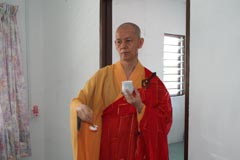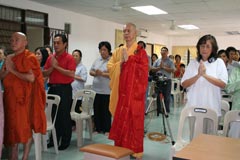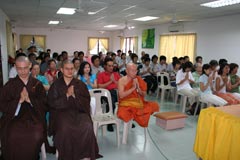Submitted by zhenliang on

As early as 2.00pm, Than Hsiang Temple's devotees had gathered at the Prayer Room of the Vihara for Than Hsiang male residents for the Cleansing Ceremony (Sar Jing). At 2.30pm, the Cleansing Ceremony began with prayers conducted by Venerable Tian Wen, Venerable Zhen Chan, Venerable Zhen Xin, and Venerable Zhen Yuan, lead by Venerable Wei Wu.
During the Cleansing Ceremony, Venerable Wei Wu went to every room and place inside and outside the building to sprinkle blessed water as an act of cleansing the area. After the Cleansing Ceremony, Venerable Wei Wu gave a Dharma talk on Cause and Effect to those present. He said that the Law of Cause and Effect is the most fundamental of Buddhist Teachings. He illustrated this by relating the story of Yuan Liao Fan. Yuan was originally known as Yuan Huang and he lived during the Ming dynasty. He had lost his father when he was young.
One day, Yuan met a distinguished looking gentleman, Mr. Kong, at a temple and Mr. Kong predicted that Yuan was destined to be a government servant. Yuan took Mr. Kong back home to meet his mother and they both tested Mr. Kong on the accuracy of his predictions. They found that Mr. Kong was always correct in his predictions whether it was for a big or minor event.
Mr. Kong predicted that Yuan would be placed 14 th in the country examination, 71 st in the regional examination and 9 th in the provincial examination. Yuan would be appointed as a magistrate in Sichuan Province and die at the age of 53 without a son to carry his family name.
Later, while Yuan was staying at Beijing, he developed an interest in meditation and lost interest in his studies. On his way to Nanjing, he visited Ch'an Master Yungu and sat in meditation with the Master in the Ch'an Hall for three days and nights without sleep. Ch'an Master Yungu asked Yuan how he was able to meditate without wondering thoughts and Yuan replied that all was fated as predicted by Mr. Kong so he had no thoughts for his future. To this, the Ch'an Master remarked that he thought Yuan had remarkable capabilities but realised Yuan was just an ordinary person. He told Yuan, “Destiny cannot bind those who cultivate great kindness or those who have committed flagrant wrong doings.” The Master then explained the Law of Karma to Yuan.
Yuan regretted all his past wrong doings, large and small, in front of the Buddha image, wrote his wish to pass the imperial examinations and vowed to complete three thousand meritorious deeds. The Master taught him how to record down his meritorious deeds and to recite the Chun Ti mantra. After receiving these teachings from Ch'an Master Yungu, Yuan changed his name to Liao Fan, meaning ‘transcending the ordinary'.
In the subsequent year, he came in 1 st in the examination that Mr. Kong predicted him to come in 3 rd ! He made a second wish to have a son and vowed to complete another three thousand good deeds. A few years later, he had a son named Tianqi. He made his third wish to pass the highest imperial examination and vowed to complete ten thousand meritorious deeds. After three years, he attained his wish and passed the examinations and was made the mayor of Baodi Country.
Yuan wrote a book, ‘The Four Lessons of Liao Fan' for his son at age 69, well past the predicted age of his death at 53 years. He subsequently died at the age of 74.
Venerable Wei Wu said there are Three Principles:
1. ‘Whatever you sow, that you reap.'
2. Own responsibility and own effect.
3. Three periods of present, next and more future life to ripen.
Cause and effect operates in past, present and future:
“If you wish to know your past, look at your present effects;
If you wish to know your future, look at your present actions!”
Venerable Wei Wu also said the best way to reduce bad karmic effects and increase good karmic effects was to keep the Five Precepts of not killing, not taking the not given, not committing sexual misconduct, not giving false speech, and not taking intoxicants; or the Ten Precepts:
1. Abstention from killing
2. Abstention from taking the not given
3. Abstention from sexual misconduct
4. Abstention from false speech
5. Abstention from slander
6. Abstention from harsh speech
7. Abstention from idle speech
8. Abstention from coveting
9. Abstention from malice
10. Abstention from wrong view.
After Venerable Wei Wu's Dharma talk, Venerable Buddhavamsa chanted some Pali verses in blessing to end the Cleansing Ceremony. All those present then enjoyed the snacks laid out for them. There were fried bee hoon, fried Indian mee, various types of nonya kueh, rich fruitcake, and various fruits.



